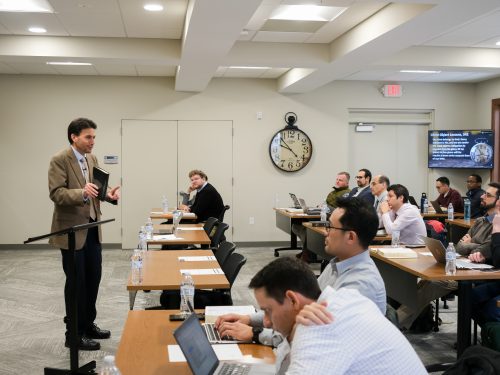Establishing the Calling
By
Judy Ringstaff
- April 1, 2023
Establishing the Calling
Behind every congregation is a pastor or team of pastors who tirelessly labor for the good of their members and the community.
The pastor’s role is a selfless one, requiring both mental and physical taxation. The pastor, says Ellen White, “stands as God’s mouthpiece to the people, and in thought, in word, in act, he is to represent his Lord” (Gospel Workers, p. 20). The pastoral calling is high and holy, understood by few. It can also be a lonely, challenging ministry, with many new pastors baptized by the fire of experience alone.
Recognizing a need for further support, Michigan’s Ministerial Association created a program to assist new pastors as they transition from school or other occupations into their calling as a minister. For decades, New in Ministry has successfully provided mentoring and guidance.
Cody Francis, Ministerial secretary, explains that New in Ministry is a four-year program, broken into eight semesters, with a different topic covered each semester. Pastors who complete all the New in Ministry modules are then eligible for ordination. He says, “School is more theoretical, theological education, but [New in Ministry] is more tips, and how to do practical ministry.”
Twice a year, New in Ministry pastors come to the conference office, spend a number of days together, and process through modules of practical ministry. Tom Hubbard, associate Ministerial secretary, shares that topics covered include church structure, church function, pastoral care, and evangelism. All are “different facets of ministry, that … new pastors really need to know,” says Hubbard.
When a new pastor is hired, often they are recent graduates, and while they understand the theology, they lack experience in practical ministry: things such as board meetings, communion, or visitations. Hubbard explains it is not uncommon for a pastor to say, “I’m supposed to do communion this week, but I don’t really know how.” No one has taught them how.
Of course, when a pastor is hired the orientation process marches through many logistics of practical ministry. But, Hubbard says, “orientation is kind of like drinking through a fire hose, and we figured it would be very beneficial to have a structured follow-up process.”
Each pastor’s experience is unique. There are often situations or circumstances which cannot be prepared for during the years of schooling. New in Ministry pastors have the guidance of not only the class time, but also of experienced pastors serving in the Ministerial Association. “There’s nothing like understanding how much you need [guidance] until you’re in that certain position,” says Hubbard. “When you know that the training being offered, what’s being communicated, is directly applicable to your everyday ministry, you are all ears.”
One especially important topic covered is pastoral care, which includes proper rest and time with one’s family. “The pastoral ministry is not a 9-5 job,” Hubbard says, “and it can be difficult for new pastors to know when to shut off.” This will lead to burn-out and fatigue, and their ministry is less efficient, even lethargic, due to lack of self-care. The pastoral family will also suffer. New in Ministry works with the pastors to ensure they are taking care of themselves and their family, so that their time dedicated to ministry is efficient and productive.
All New in Ministry pastors check in with the Ministerial Association monthly, sending short reports of how their effectiveness in ministry has progressed, what they have learned, and what they will continue to improve upon in the months to follow.
Francis explains that the Seventh-day Adventist Church believes in the Biblical injunction of 1 Timothy 5:22, which states “lay hands suddenly on no man.” He further explains that before ordination, the Ministerial Association wants “[pastors] to be grounded in their calling to ministry and have all the tools for successful ministry.” The four years of New in Ministry gives pastors a time to “grow in their ministry” and be “settled in their call.”
The ordination service is public recognition of the call to ministry. However, before a pastor is eligible for ordination, surveys are sent out to key leaders in the pastor’s church, and the pastor and his wife also meet with a board, consisting of the Ministerial associates, the Michigan Conference officers, and their wives. They evaluate how the pastor has grown in his ministry, and the effectiveness of his work. The pastor’s calling will be seen in his work and in his church member’s reflections upon his service.
After all, the pastor is “engaged in a very solemn, sacred work” (Evangelism, p. 184). Carefully reviewing all aspects of the pastor’s ministry before ordination is a way to ensure that one is ready for such a sacred calling.
Twenty-five pastors in the Michigan Conference are currently participating in the New in Ministry program.


